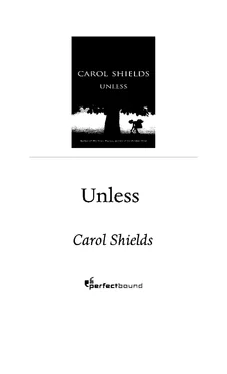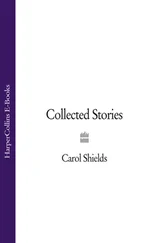Carol Shields - Unless
Здесь есть возможность читать онлайн «Carol Shields - Unless» — ознакомительный отрывок электронной книги совершенно бесплатно, а после прочтения отрывка купить полную версию. В некоторых случаях можно слушать аудио, скачать через торрент в формате fb2 и присутствует краткое содержание. Жанр: Современная проза, на английском языке. Описание произведения, (предисловие) а так же отзывы посетителей доступны на портале библиотеки ЛибКат.
- Название:Unless
- Автор:
- Жанр:
- Год:неизвестен
- ISBN:нет данных
- Рейтинг книги:4 / 5. Голосов: 1
-
Избранное:Добавить в избранное
- Отзывы:
-
Ваша оценка:
- 80
- 1
- 2
- 3
- 4
- 5
Unless: краткое содержание, описание и аннотация
Предлагаем к чтению аннотацию, описание, краткое содержание или предисловие (зависит от того, что написал сам автор книги «Unless»). Если вы не нашли необходимую информацию о книге — напишите в комментариях, мы постараемся отыскать её.
Unless — читать онлайн ознакомительный отрывок
Ниже представлен текст книги, разбитый по страницам. Система сохранения места последней прочитанной страницы, позволяет с удобством читать онлайн бесплатно книгу «Unless», без необходимости каждый раз заново искать на чём Вы остановились. Поставьте закладку, и сможете в любой момент перейти на страницу, на которой закончили чтение.
Интервал:
Закладка:
I passionately believe a novelist must give her characters work to do. Fictional men and women tend, in my view, to collapse unless they’re observed doing their work, engaged with their work, the architect seen in a state of concentration at the drafting table, the dancer thinking each step as it’s performed, the computer programmer tracing a path between information and access. Emma Allen believes that the great joy of detective fiction is watching the working hero being busy every minute with work; work in crime novels is always in view, work is the whole point.
I’ve read novels about professors who never step into the classroom. They’re always on sabbatical or off to a conference in Hawaii. And artist-heroes who never pick up a paintbrush, they’re so busy at the local café, so occupied with their love life or their envy or their grief.
Does the brilliant young botanist with the golden back-swept hair, one wisp loose at her neck, wander up a grassy hillside and fill her pockets with rare species? No, we see her only after work or on weekends when she goes to parties and meets young novelistic lawyers who have no cases to work on, no files, no offices, no courtrooms in which to demonstrate their skills.
That husky young construction worker does all his sexual coupling between shifts, and with a blonde-headed graduate of Mount Holyoke as his partner — what about that? Just once I’d like to see him with the pneumatic drill hammering against his body, shaking him stupid. But what if the novelist is a Yale grad, and his father before him? What would he know about how that drill kicks and jumps and transfers its nerves into the bones and belly of a human being?
We might see the poor guy reach out for humanistic understanding, discovering Shakespeare-in-the-Park or French cinema, something like that, but chances are against seeing him work.
I love work. When I meet people I always want to ask them what they do, but Lynn Kelly tells me this is no longer an allowable conversational probe. There are too many people who are unemployed or else ashamed of what they do, assembly work in condom factories, for example, or exterminating cockroaches. Work can be ugly. Work is a sensitive issue. The last time I asked a woman what she “did” — this was at a Christmas party a couple of weeks ago — she gave me a look and said, “I don’t do anything.” Then she intensified her glare and said, “And I don’t do courses either.” (When the time comes for my lobotomy this is one of several social incidents I plan to remove.)
But why did I make Roman a trombonist in the first place if I knew nothing about trombones? Because I was sitting in my little box room, stuck on a paragraph in an early chapter, and idly springing a French paper clip back and forth in my fingers. When we were in France — admittedly this is an affectation — I brought back a large box of paper clips, which are pointed at one end instead of rounded. They look different from our North American paper clips, they look chic, they look French. And they’re known to the French, who love to press endearments on objects, as trombones. This was how Roman acquired his vocation in the world of brass, through an accident of association, because I, the stalled writer of a first novel, happened one afternoon to be twisting un petit trombone in my hands and thinking about giving my male character some real work to do.
Horst Raasch, Roman’s hero and teacher, claimed that the trombone should strive for a sound not unlike the cello, coming out in long slow heartbeats. Raasch taught him to attack the tone softly but clearly, keeping the tone stands steady. “Tonal beauty” was the ultimate goal. Roman began serious study at fourteen with a Kruspe Modell Weschke — which his family could scarcely afford; his grandfather saved coins in a pickle jar in order to purchase this instrument. The Sachse Concerto was chosen — Roman can’t remember why — for his mid-term exam, and he succeeded brilliantly. He loved the idea of being brilliant, and began to practise more and more so that he could be brilliant all the time. He learned, eventually, to perform with exactitude, the eighths, triplets, sixteenth, and thirty-second notes. He developed an excellent high register. On off-hours he stumbled into jazz: “Sleepy Lagoon,” “Stardust,”
“I’m Getting Sentimental over You,” but he had to hide that side of himself from purists. He was good, more than good, as his appointment to the Wychwood Symphony confirms.
The trombone is a difficult instrument to master, since the tolerance between the inner and outer slides is so precise that lubrication is needed. At one time Pond’s cold cream was the chosen lube, but recently there have been tailored-to-the-need products such as silicone drops, applied weekly and augmented by a creamy soapy liquid. Most trombonists also need an occasional squirt of water from an atomizer, keeping the mechanism moist and slippery. The F-attachment has, needless to say, made an immense difference to symphony trombonists, not least because it adds a few notes to the bottom range — and Roman loves the bottom range.
He knows how fortunate he is to be employed by an eminent orchestra, but his feet are itchy these days, and his “differences” with Sylvia Woodall, the bassoonist, are coming to a head; he loathes the woman. In addition, he feels a longing to visit Albania, the land of his forefathers.
As a novelist, I am somewhat surprised by the complexity of Roman’s vocation and have to ask myself, every day, how I got into such complexity.
Alicia I put to work at an unnamed fashion magazine, and this, too, I regret. My idea of magazine ambiance comes from TV or films. I have no idea what the fashion-magazine workplace looks like or how magazine people interact. I like to think that Alicia sees through the fraud of fashion or that she raises fashion to the level of style and style to the level of imprimatur, all of it stacked neatly under the elegant and sensible rubric of being. I pretend, when she writes about gloves or handbags or shoes, that she is looking at the history or the philosophie of these objects. She is amused by them, but respectful; otherwise she would, out of disgust, enrol at Wychwood University and do a doctorate in, say, Chinese women’s poetry in the second half of the eighteenth century. But a work shift of that order is cataclysmic, and I doubt my ability to make the change plausible to readers who are quite happy to linger in the sleek, perfumed boardroom and corridors of X Magazine. Something would have to trigger the impulse, something traumatic to make loyal, hardworking, serious, sincere Alicia abandon the fashion world for academe. And then she would have to write a thesis, and I would become a woman writing about a woman writing about women writing, and that would lead straight to an echo chamber of infinite regress in company with the little Dutch girl, the girl on the bathroom cleanser, the vision multiplied, but in receding perspective. No.
The problem is, I’m not sure I believe in the thunderclap of trauma. A stubborn screen of common sense keeps getting in my way and cancelling the filigree of fine-spun theory. Isn’t our species smarter than that? Somewhere, wired into our brains, there must exist a little bean-shaped nerve cluster that registers the relative proportion of events and separates the exceptional experience that we can shrug off simply because it is exceptional from the slow, steady accumulation of incremental knowledge, which is what really delivers us to the brink, one small injury bleeding into another until the whole system tips over.
I don’t actually say this aloud to Tom as he delves into the subject of trauma, hoping to rescue or at least understand Norah by tracking down that “thing” that leapt out at her last spring and knocked her out of her life. I don’t want to discourage his pursuit, which, even if it leads nowhere, at least affords him a distraction. As long as he finds parallel examples, he can believe. He is certain his own mother, for instance, has been traumatized by Norah’s stance.
Читать дальшеИнтервал:
Закладка:
Похожие книги на «Unless»
Представляем Вашему вниманию похожие книги на «Unless» списком для выбора. Мы отобрали схожую по названию и смыслу литературу в надежде предоставить читателям больше вариантов отыскать новые, интересные, ещё непрочитанные произведения.
Обсуждение, отзывы о книге «Unless» и просто собственные мнения читателей. Оставьте ваши комментарии, напишите, что Вы думаете о произведении, его смысле или главных героях. Укажите что конкретно понравилось, а что нет, и почему Вы так считаете.












